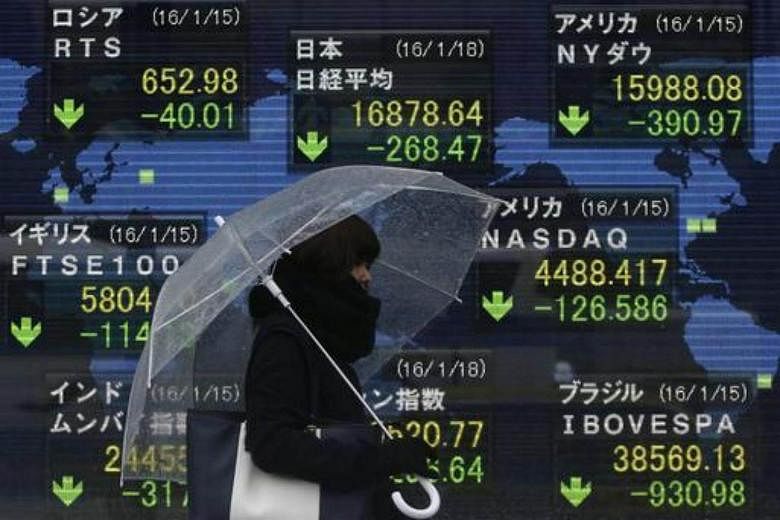SINGAPORE (REUTERS) - Asian stocks struggled on Friday (Aug 4) after a technology-led drop on Wall Street, while the US dollar remained under pressure on signs that probes into possible Russian interference in the 2016 US elections are gathering pace.
MSCI's broadest index of Asia-Pacific shares outside Japan was marginally higher, with many investors reluctant to stake out fresh positions ahead of US job data later in the global day.
The index was poised to rise 0.2 per cent for the week, taking its gains for far this year to nearly 24 per cent.
Japan's Nikkei dropped 0.4 per cent on a stronger yen, and looked set to end the week little changed.
South Korea's KOSPI, which closed at a 3-1/2-week low on Thursday, recovered 0.3 per cent. It is down 0.4 per cent this week.
Overnight, the S&P and Nasdaq closed 0.2 per cent and 0.35 per cent lower respectively.
The declines were led by technology shares, with the S&P tech index tumbling 0.35 per cent.
But the Dow managed to post slight gains, staying above the 22,000 level breached on Wednesday.
"When you hit these major milestones it's not unusual to trade sideways for a few days," said Phil Blancato, CEO of Ladenburg Thalmann Asset Management in New York.
Stocks fell to intraday lows late in the session after the Wall Street Journal reported that Special Counsel Robert Mueller has impaneled a grand jury in Washington to investigate allegations of Russia's interference in the elections. But major indexes quickly recouped those losses.
Two sources told Reuters on Thursday that grand jury has issued subpeonas in connection with a June 2016 meeting that included US President Donald Trump's son, his son-in-law and a Russian lawyer.
"The grand jury is a sign that the investigation is growing in intensity over the Trump campaign's possible collusion with Russia," Stephen Innes, head of Asia-Pacific trading at OANDA, wrote in a note. "Another toxic elixir for the greenback is brewing."
Mixed economic data did not help matters for Treasury yields or the dollar.
US 10-year Treasury yields fell to their lowest since late June following the Journal report.
Benchmark 10-year notes were at 2.2212 per cent early on Friday. On Thursday, they fell to as low as 2.218 per cent, their lowest level since late June, and closed at 2.228 percent.
While the number of Americans filing for unemployment benefits fell last week, and US-based employers announced the fewest job cuts in eight months last month, services sector activity moderated to a 11-month low in July.
The dollar index, which tracks the greenback against a basket of six major peers, languished near the three-month low hit earlier this week. It was down 0.15 per cent early on Friday at 92.702 percent, set to end the week 0.6 percent lower.
The dollar also slipped 0.2 per cent to 109.82 yen, its lowest since mid-June. It is on track for a weekly loss of 0.75 per cent.
Markets are now awaiting July's employment report, due later in the session, for clues on whether it will impact the timing of Federal Reserve's gradual policy tightening.
Nonfarm payrolls probably increased by 183,000 jobs last month after surging by 222,000 in June, according to a Reuters survey of economists. The unemployment rate is seen falling one-tenth of a percentage point to 4.3 per cent.
The pound hit a nine-month low against the euro overnight and held near that level early on Friday after the Bank of England's policymakers kept interest rates at a record-low 0.25 per cent.
"The unsavoury combination of uninspiring UK economic data in July and uncertainty surrounding Brexit talks has pressured BoE hawks and dented expectations of a rate hike occurring anytime soon," said Lukman Otunuga, research analyst at ForexTime. "With the central bank downgrading its UK GDP growth forecast for both this year and 2018, sterling is poised for further punishment down the road."
The pound was 0.9042 to the euro early on Friday, after falling to as low as 0.9048, its weakest since Nov. 2.
That helped lift the FTSE 0.85 per cent.
A 0.5 per cent jump in retail sales in the euro zone in June from May, well above market expectations of a 0.1 percent rise, gave the euro a boost.
The common currency was up 0.1 per cent to US$1.1884, extending Thursday's 0.1 per cent gain. It is set to end the week 1.2 per cent stronger.
In commodities, oil prices remained under pressure following losses overnight. Persistent concerns about high crude supplies from Opec offset the previous day's data showing record U.S. gasoline demand.
US crude was little changed at US$49.04 a barrel, after sliding 1.1 per cent overnight, putting it on track for a weekly loss of 1.3 per cent.
Global benchmark Brent slipped 0.1 per cent to US$52.01, extending Thursday's 0.7 per cent loss, headed for a 1 per cent weekly decline.
The dollar's loss was gold's gain, with the precious metal rising in early trade. Spot gold climbed 0.1 per cent to US$1,269.71 an ounce, after Thursday's 0.15 per cent gain, and set to end the week little changed.

